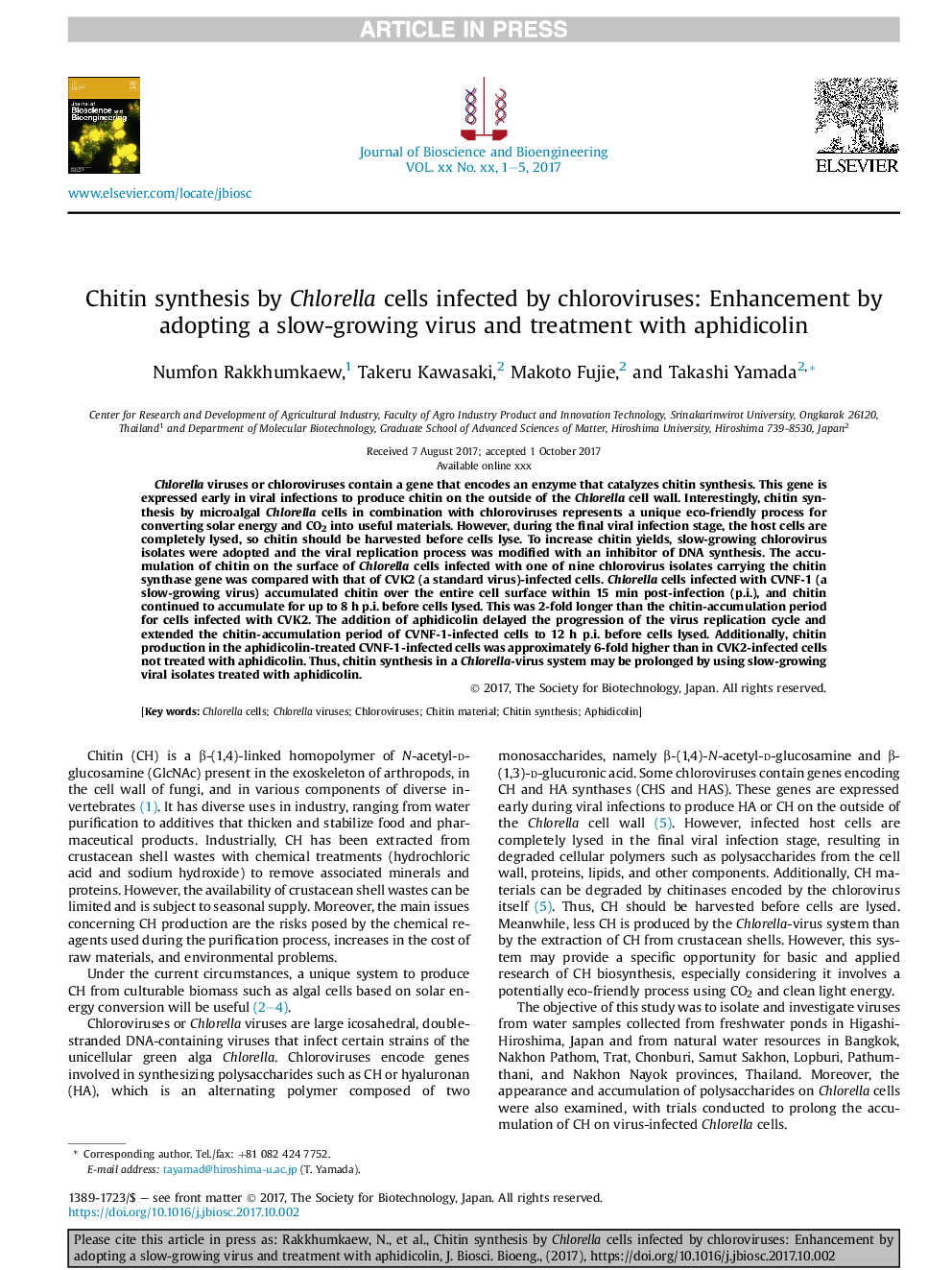| کد مقاله | کد نشریه | سال انتشار | مقاله انگلیسی | نسخه تمام متن |
|---|---|---|---|---|
| 6489933 | 1416544 | 2018 | 5 صفحه PDF | دانلود رایگان |
عنوان انگلیسی مقاله ISI
Chitin synthesis by Chlorella cells infected by chloroviruses: Enhancement by adopting a slow-growing virus and treatment with aphidicolin
ترجمه فارسی عنوان
سنتز کیتین توسط سلول های کلرلا آلوده به کلروویروس ها: افزایش با استفاده از ویروس آهسته رشد و درمان با آفییدیکولین
دانلود مقاله + سفارش ترجمه
دانلود مقاله ISI انگلیسی
رایگان برای ایرانیان
کلمات کلیدی
سلول های کلرلا، ویروس کلرلا، کلروویروس ها، مواد چیتین، سنتز کیتین، آفییدیکولین،
موضوعات مرتبط
مهندسی و علوم پایه
مهندسی شیمی
بیو مهندسی (مهندسی زیستی)
چکیده انگلیسی
Chlorella viruses or chloroviruses contain a gene that encodes an enzyme that catalyzes chitin synthesis. This gene is expressed early in viral infections to produce chitin on the outside of the Chlorella cell wall. Interestingly, chitin synthesis by microalgal Chlorella cells in combination with chloroviruses represents a unique eco-friendly process for converting solar energy and CO2 into useful materials. However, during the final viral infection stage, the host cells are completely lysed, so chitin should be harvested before cells lyse. To increase chitin yields, slow-growing chlorovirus isolates were adopted and the viral replication process was modified with an inhibitor of DNA synthesis. The accumulation of chitin on the surface of Chlorella cells infected with one of nine chlorovirus isolates carrying the chitin synthase gene was compared with that of CVK2 (a standard virus)-infected cells. Chlorella cells infected with CVNF-1 (a slow-growing virus) accumulated chitin over the entire cell surface within 15Â min post-infection (p.i.), and chitin continued to accumulate for up to 8Â h p.i. before cells lysed. This was 2-fold longer than the chitin-accumulation period for cells infected with CVK2. The addition of aphidicolin delayed the progression of the virus replication cycle and extended the chitin-accumulation period of CVNF-1-infected cells to 12Â h p.i. before cells lysed. Additionally, chitin production in the aphidicolin-treated CVNF-1-infected cells was approximately 6-fold higher than in CVK2-infected cells not treated with aphidicolin. Thus, chitin synthesis in a Chlorella-virus system may be prolonged by using slow-growing viral isolates treated with aphidicolin.
ناشر
Database: Elsevier - ScienceDirect (ساینس دایرکت)
Journal: Journal of Bioscience and Bioengineering - Volume 125, Issue 3, March 2018, Pages 311-315
Journal: Journal of Bioscience and Bioengineering - Volume 125, Issue 3, March 2018, Pages 311-315
نویسندگان
Numfon Rakkhumkaew, Takeru Kawasaki, Makoto Fujie, Takashi Yamada,
